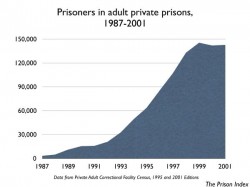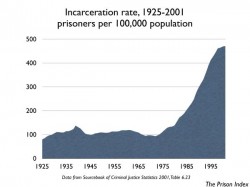New legislation has just been introduced by the Harper government. It’s no surprise that Harper’s taking the “Get Tough on Crime” approach: it’s a perfect fit for his George Bush Mini-Me leadership style.
These guys are tackling crime like we’re experiencing an unprecedented explosion of it and it must be stopped before the criminals seize control of society and destroy everything that is good and honourable, and take all our stuff and force us decent folk into drug addiction and prostitution.
They’re also tackling it in a way that is notorious for not working.
 The focus of the new legislation appears to be mostly young offenders and drug crime. It includes mandatory minimum sentences and greater provisions for incarcerating youth prior to trial.
The focus of the new legislation appears to be mostly young offenders and drug crime. It includes mandatory minimum sentences and greater provisions for incarcerating youth prior to trial.
The implementation of this legislation will almost certainly lead to the kind of explosive growth in prisons seen in the US, and to the privatization of corrections.
 Since the 1980s, the US has been waging its War on Drugs, combined with mandatory minimum sentences.
Since the 1980s, the US has been waging its War on Drugs, combined with mandatory minimum sentences.
The tougher the US gets on crime, the higher their incarceration rate climbs.
- The number of US prisoners increased more than sixfold between 1970 and 2005.
- In 2005, one out of every 136 Americans was incarcerated in a prison or jail.
- The US incarcerates more people per hundred thousand population than any other country in the world (more than six times Canada’s rate).
- 22% of all the incarcerated people in the world are in the US.
- A black male in the US has a statistically better chance of going to prison than he does of going to college.
- 62% of jail inmates in 2005 had not been convicted: they were awaiting trial.
- 76% of people sentenced to time in State prisons in 2002 were convicted of non-violent crimes.
- One in four inmates in 2002 had been convicted of a drug offense.
(Source)
Is it working? I suppose that depends on what the objective is. It’s working to keep a whole lot of children without fathers, a whole lot of families dependent on welfare, a whole lot of small-time criminals learning from the pros how to become bigger criminals, and a whole lot of Black men permanently disenfranchised (a number of States prohibit persons with past or current felony convictions from voting. In 2000, 13% of Black men had been stripped of their right to vote – source.).
As for the crime rate, well, throwing everybody in prison doesn’t appear to be making the US a safer place. Americans certainly don’t feel any safer. A bi-partisan panel in 2006 concluded that Americans receive a dismal return on their huge prison investment.
And this is what Stephen Harper wants to emulate. It’s not going to be cheap, not by a long shot. And it’s not going to work. If we’ve got that kind of money to throw around, how come we can’t afford to build residential treatment centres for addicts? How come we can’t afford to create alternative opportunities for youth? How come we can’t afford anti-poverty measures to prevent crime?
Tags:
















this is actually a comment related to the last post, re mentioning our concerns about the degeneration of the city to our fearless leader. O’Blivious
But, it’s basically relevant to attempts to stem the rise of obliviousness to human needs, aspirations, suffering etc at all levels. This is an extra meeting for some reason not metioned in Diane Holmes’ list:
Ottawa residents are invited to participate in
the City’s review of its Official Plan – an
important part of the Beyond 20/20 initiative.
The Plan is reviewed every five years as directed
by Ontario’s Planning Act. As
part of the consultation process, a City Cafe is
being held this Saturday, November 24 from 8:30
a.m. to 1 p.m. at Lansdowne Park, Exhibit Hall.
Mayor O’Brien has invited Ottawans to share their
views with him at the City Café public forum. The
deadline to register is today Wednesday November 21 (I just registered successfully):
To register today for the City Cafe, visit the
website: https://ottawa.ca/cgi-bin/form.cgi?dir=beyond_2020&form=city_cafe_en
For more information about Beyond 20/20 see:
http://ottawa.ca/residents/public_consult/beyond_2020/index_en.html
Thanks Janet!